If you’re battling one of these three types of hormonal imbalances, the keto diet can help put things back in order.
Your body relies on a complex balance of hormones, and not just the reproductive kind. Aside from sex drive and fertility, hormones regulate blood sugar, stress levels, metabolism and other important aspects of your health.
When your hormones get kicked out of balance, the effects can be detrimental. One imbalanced set of hormones can offset the next, resulting in hormonal chaos that can be difficult to set right.
Curious about ketosis?
Click here to get the FREE Easy Keto Guide to learn the right way to go keto!
Fortunately, the keto diet might be able to provide a sturdy baseline for many hormones, particularly in the case of three major areas: insulin, PCOS, and menopause. Here’s how it works.
What Is The Keto Diet?
Keto is a high-fat, low-carb diet that shifts the body into a ketone burning state. Normally the body relies on carbs broken down into glucose for energy, but when in ketosis, the body relies on ketones made from a high intake of fat. This carb-negative state can lead to rapid weight loss, improved cholesterol and triglycerides, and decreased blood sugar. (1)
Keto is a major dietary overhaul that works by tracking macros. In order for keto to be successful, fat needs to be the highest macronutrient, followed by protein, and very few carbs. The exact amount of carbs that people can eat and still be in ketosis differs from person to person, based on your BMI, sex, activity level, and dietary factors like how much protein you’re eating.
How the Keto Diet Balances Hormones

Lifestyle changes, like going keto, can help correct certain hormone imbalances naturally. While keto won’t work for everyone, there are six key reasons that this low-carb diet might be able to ease symptoms.
Of course, dietary changes affect people differently. Before making any major shifts to your diet, consult with your doctor or nutritionist, who can best advise you based on your own personal needs.
1. Decreases Blood Sugar Levels
Even if you’re eating high-quality carbs, they all ultimately break down into glucose. For some women in menopause or who have PCOS, insulin resistance can lead to even more stored fat. In turn, this weight gain and insulin resistance can also worsen the estrogen dominant symptoms of menopause. (2)
A ketogenic diet helps to balance insulin, decreasing blood sugar levels and reducing the chances of developing type 2 diabetes. For menopausal women who are already overweight and struggling to normalize blood sugar levels, keto could be a therapeutic lifesaver. (3, 4)
2. Improves Hot Flashes
Hot flashes are tied to changes in estrogen levels, and can affect both menopausal women and those with PCOS. They occur when the part of the brain that regulates stress becomes less stable and when suddenly triggered, can result in a sudden and uncomfortable increase in body temperature. It usually passes within minutes. (5)
Going about normal life when your body turns into an internal furnace on high blast can certainly be difficult. Keto helps cool those hot flashes by providing a constant source of fuel to the brain – ketones – that is more easily utilized and kept at more stable levels than glucose. (6)
3. Protects Brain Health
While menopause is a natural part of aging, it can affect cognition. That’s because the changes in reproductive hormones decrease the brain’s function. (7) Likewise, PCOS and insulin problems put the brain at risk for complications down the road, like Alzheimer’s and dementia. (8)
These cognitive problems are partially tied to the brain’s need for fuel. With low hormone levels, the brain struggles to get what it needs.
The keto diet is protective against brain disorders like Alzheimer’s because it provides the brain with a different source of fuel that prevents lapses in energy stability. (9, 10)
4. Helps with Weight Loss
You’ll feel less hungry on the keto diet since keto can balance out the hormones that control appetite: ghrelin and leptin. It also stabilizes insulin, which is needed for post-meal energy use.
When these three hormones are not functioning as they should be, it leads to increased signaling for hunger, decreased feelings of fullness after eating, and imbalanced insulin levels that might also trigger the desire to eat to get more glucose.
Keto’s ability to balance these hormones is just one of the ways that it can lead to natural weight loss, since you’ll naturally eat less when you aren’t as hungry. Also, the food you eat on a ketogenic diet is nutrient-dense, meaning you can eat less without doing harm to your body. (11)
5. Boosts Energy and Improves Sleep
Between hot flashes and mood changes, hormone disruptions can suck your energy dry. It can also disrupt your sleep, leading to poor levels of restorative rest.
A keto diet is packed with nutrient-dense fats and protein, which can both serve as a slower-burning form of energy. This means no post-meal crashes from blood sugar dives, and a steadier source of all-day energy.
Hormonal imbalances of any kind can trigger an increase of cortisol, the stress hormone, as well as disrupted neurotransmitters, leading to restless sleep. Keto helps to boost gut health, where a large portion of serotonin (a neurotransmitter that provides emotional calm and stability) is made. It also helps to streamline cortisol levels, decreasing your body’s stress levels, leading to higher energy throughout the day and better sleep at night. (12, 13)
6. Cools Inflammation
Inflammation can trigger all kinds of unfortunate symptoms during PCOS or menopause, like fibromyalgia, thyroid disorders, and arthritis. (14)
A keto diet that is rich in omega-3 fatty acids, like salmon and mackerel, can help to decrease inflammation in the body. As a result, you’ll experience less pain and symptoms from inflammatory disorders. (15)
Hormonal Changes Keto Can Address

Hormones exist in a sometimes precarious balance in the body. When they get disrupted, this can lead to weight gain, inflammation, and other health conditions. While keto isn’t a magic hormone-balancing diet, there are certain situations where keto can help get things back on track.
Here are the top three hormonal changes that keto can help address.
Menopause
Menopause is a natural part of life for women, but that doesn’t make it easy. The changes and symptoms can affect the quality of life in major ways, like unexpected weight gain and other health problems.
The hormonal changes that cause symptoms of menopause are a result of the shifting levels of estrogen and progesterone. When ovulation ceases and menstruation stops, a woman’s natural source of progesterone drops dramatically, creating an imbalance of excess estrogen.
The relative lack of progesterone to counterbalance the estrogen leads to night sweats, hot flashes, mood imbalances, and weight gain. (16)
Hormone changes during menopause can also negatively affect mood, leading to anxiety and higher levels of stress hormones. This can result in slowed metabolism, blood sugar problems, and weight gain. (17)
PCOS
Polycystic ovarian syndrome, or PCOS, is a hormone-driven condition that affects women of reproductive age. One in 10 women has PCOS or similar hormone imbalances, typically involving higher levels of androgens like testosterone, as well as estrogen dominance. (18)
PCOS also affects the way the body responds to insulin, resulting in overlapping symptoms with diabetes. Often times, women with PCOS are overweight, have trouble losing weight, or have blood sugar troubles.
Because ovulation is dependent on a tightly regulated hormone balance, it is often interrupted in PCOS, and can result in infertility and highly irregular menstrual cycles.
Insulin and Diabetes
Men and women alike can experience insulin resistance, a condition that affects the way the body responds to sugar.
When you eat carbs, they’re digested and broken down into simple sugars and sent into the bloodstream. Insulin is released at this time to take glucose into cells for energy use and storage, but when the body resists insulin’s activity – as in type 2 diabetes or metabolic syndrome – higher levels of glucose continue circulating in the bloodstream, resulting in elevated blood sugar.
High blood sugar is associated with negative effects like weight gain, inflammation, and other chronic conditions. It even increases the risk of heart disease. (19)
Starting a Keto Diet for Hormone Balance

1. Make Sure It Fits Your Needs
Before starting a keto plan, make sure that your doctor or nutritionist approves. The keto diet is not right for everyone, and most women of reproductive age need significantly more carbohydrates than keto has to offer.
Those most likely to benefit from keto include those who need to lose weight and those with insulin resistance, metabolic syndrome, type 2 diabetes, or neurodegenerative disorders or risk-factors for them (like Alzheimer’s and Parkinson’s). (20, 21)
2. Try Carb Cycling
Many experts recommend that women utilize a modified keto diet that focuses more on carb cycling than constant nutritional ketosis.
To do this, alternate the number of carbs you eat on certain days. For example, 3-4 days of very low carbs (80 grams or less) followed by 1 day of higher carbs (100-150 grams). Note that carb cycling doesn’t mean there is a free-for-all day where you can eat whatever you want in huge quantities.
3. Balance Your Omega-3s
In order for keto to be effective, you need to get enough omega-3s in your diet. A general rule of thumb is that land-based animal foods are higher in omega-6 fatty acids, and most seafood is higher in omega-3s. A ketogenic diet without enough omega-3 fats will increase an inflammatory load, not decrease it. (22)
The top ketogenic foods that are rich in omega-3s include:
- Salmon
- Mackerel
- Sardines
- Chia seeds
- Anchovies
- Grass-fed beef
4. Stay Hydrated
Keto can be hard on the kidneys, since you’re getting a higher volume of uric acid from proteins. That’s why it’s very important that you drink enough water on keto.
Kidney health aside, staying hydrated is especially vital during menopause. Hormone changes influence fluid balance in cells and tissues as it is, so minimizing the additional effects from keto dietary changes is needed in order to see a decrease in symptoms. (23)
5. Manage Your Stress
Stress is naturally higher when your hormones are running amuck, but you can improve the way your body digests food and handles stress by practicing yoga. If yoga isn’t your cup of tea, you might also try meditation, massage, or acupuncture, which can also help address the physiological aspects of stress. (24)
Bottom Line
Hormone imbalances can be frustrating, but they don’t have to wreck your life. Using lifestyle supports, like dietary changes, can lead to a decrease in unpleasant symptoms and can improve overall quality of life.
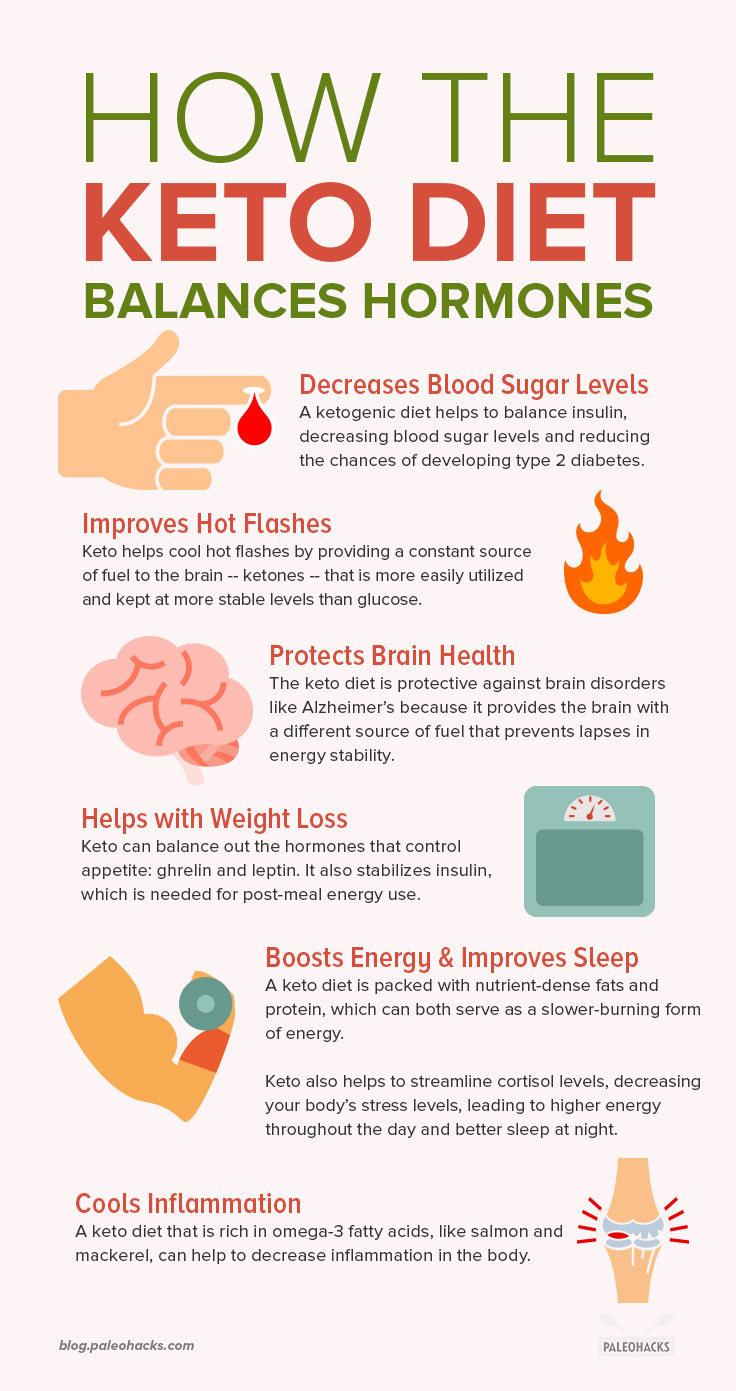
Thinking about trying keto to balance out your hormones? Arm yourself with an arsenal of delectable keto treat recipes with our book, Keto Sweets. With over 80 dessert recipes to choose from, Keto Sweets will sate sugar cravings without the sugar, and keep you on track with your health goals.
(Read This Next: Keto For Women: 5 Must-Know Tips for Success)


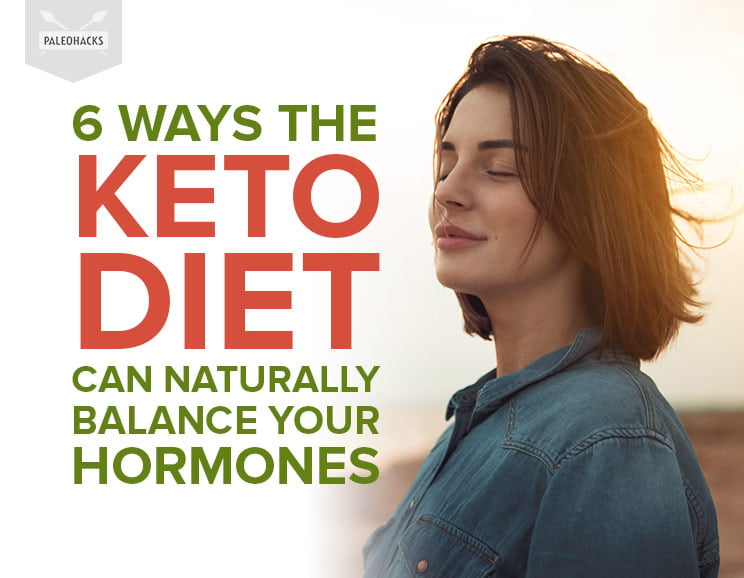
 Almond Butter S’mores Pie
Almond Butter S’mores Pie


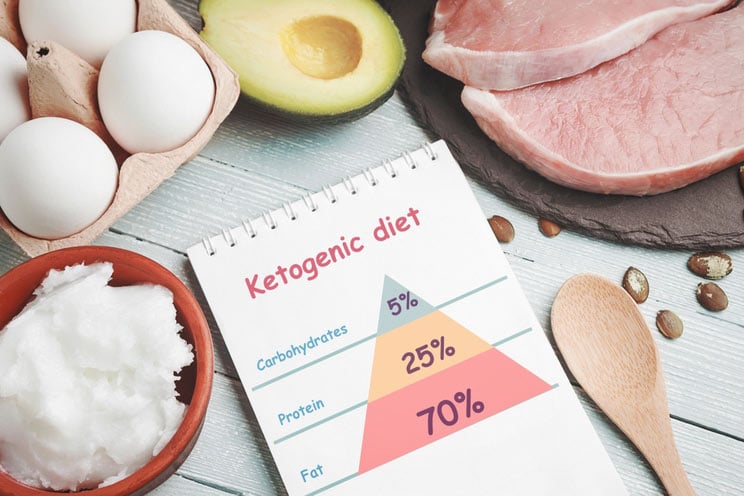
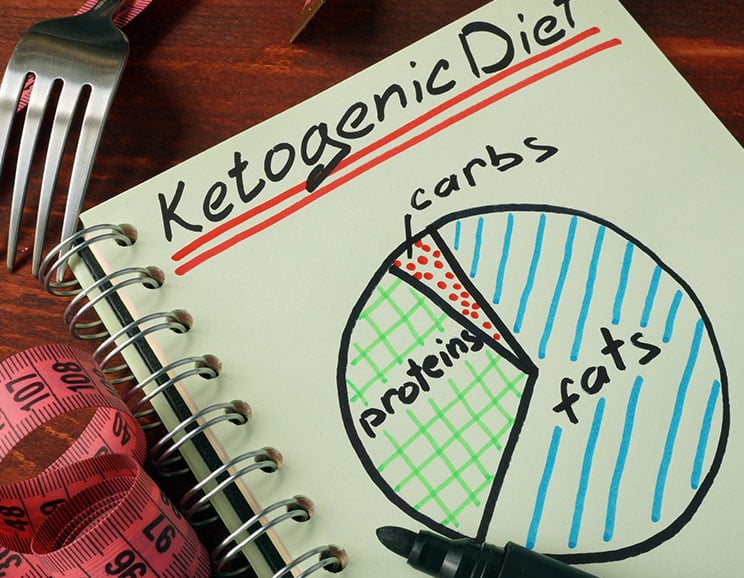




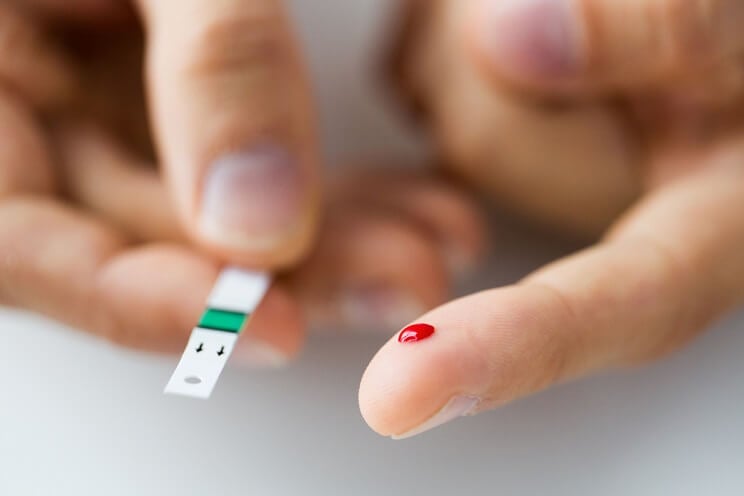
Show Comments